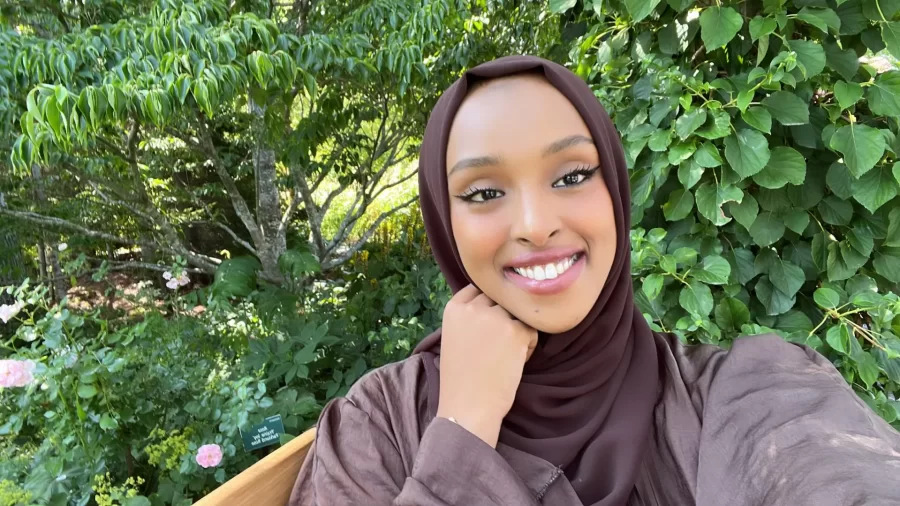Introducing Fatuma Haji
Fatuma Haji, the Harward Center’s new Assistant Director of Volunteer Programs and Community Partnerships, has always enjoyed working with people–though it was very much a winding road to figure out exactly what she wanted to do.
Immigrating from Kenya as a child, Fatuma lived in Lewiston for adolescent life, going to both Lewiston Middle and High School. She graduated from Stonehill College with a bachelor’s degree in Psychology and a minor in Health and Human Services. Fatuma then worked several jobs in the human services field, including being a patient representative at Beth Israel Hospital, a case worker for adults and aging populations, and a social worker in Child Protective Services. “I really liked working with people, but I also wanted to see a tangible positive effect. In many cases, the people I worked with did not think they were actually being helped, especially in the case of Child Protective Services, and honestly, that took a negative emotional toll.”
Those explorations ultimately led Fatuma to apply for the Harward Center position – because it would allow her to continue working with people, use her social services expertise, and also see more of the positive impact firsthand. Furthermore, she strongly believes in the principles of the Harward Center–most noticeably that the work done here is not “service” work but rather community “engagement.” Bates students are not “saving” the L/A community or serving “the less fortunate.” Instead, they participate in a symbiotic learning experience that benefits both Bates students and the community. They also expand their learning through real world experiences. “While courses and textbooks are important,” she reflects, “actually applying what students learn to tangible work in community is equally important.”
Fatuma offers a unique perspective, being someone who knows Lewiston very well in addition to her variety of job experiences. She recognizes that despite good intentions, Bates and Lewiston are still quite divided. Even though there are no physical barriers, “just seeing the buildings when you drive into Bates [versus the rest of Lewiston] is shocking.” As much as Bates wishes to be genuinely connected to Lewiston, the Bates Bubble is certainly noticeable for someone who lives in Lewiston. “Bates has its own priorities, and Lewiston has theirs. The class divide is also very noticeable, with the majority [at Bates] having more wealth and coming from very different backgrounds [than those who live in Lewiston].” While Fatuma appreciates the work the Harward Center does tremendously, she also sees the potential for more and deeper involvement in the off-campus community.
She herself very much hopes to make Bates and Lewiston more cohesive, and get students to be more involved. She believes there are steps we can take to make that happen. “The first thing we can do is to continue to sustain the community partnerships we have now, as well as starting new ones. I know some Bates students even have started their own programs in the community” (referring to Tree Street Youth, cofounded by a Bates graduate). To Fatuma, though, expanding the Community Engagement Learning program is what can really get students motivated. She acknowledges that Bates cannot force kids to engage, but “if the college does not at least push for it, students will always just think ‘why bother?’ If we actually incorporate it thoroughly into the academic experience and show that the school really values community-engaged learning, it will get more people to do this work naturally.” Getting exposed to CEL work was how I got involved with the Harward Center, and both Fatuma and I highly recognize the value of the work–and think any discipline can incorporate it into course work if professors care to do so. When Bates students get involved in Lewiston and show people that Bates cares, the college-community divide and the consequential tension that comes with it are eased.
Lastly, I asked Fatuma a lot about the negative stereotypes Bates students have about Lewiston–for example, that it is unsafe and not somewhere they should venture into. I was curious as to how she thinks we can get students to view L/A differently. “I lived in Atlanta, Seattle, and Boston,” she noted. “And the safest I ever felt was here in Lewiston. Of course, you should explore with a friend, but going into Lewiston and seeing the various potential opportunities is something I encourage all students to do.” She acknowledges that students are busy, “but at the end of the day, it is only one hour of your day or week. Even go on the weekend. I know everyone has at least one hour they could dedicate to the community, and there is really an opportunity for everyone.” And if you are willing to dedicate that hour but do not know where to start, head over to the Harward Center or shoot an email to Fatuma–she is ready to help you get started!
Email: fhaji2@bates.edu
